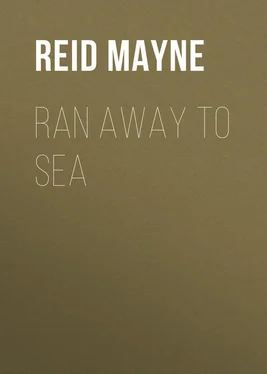Mayne Reid - Ran Away to Sea
Здесь есть возможность читать онлайн «Mayne Reid - Ran Away to Sea» — ознакомительный отрывок электронной книги совершенно бесплатно, а после прочтения отрывка купить полную версию. В некоторых случаях можно слушать аудио, скачать через торрент в формате fb2 и присутствует краткое содержание. Жанр: literature_19, foreign_antique, foreign_prose, foreign_children, на английском языке. Описание произведения, (предисловие) а так же отзывы посетителей доступны на портале библиотеки ЛибКат.
- Название:Ran Away to Sea
- Автор:
- Жанр:
- Год:неизвестен
- ISBN:нет данных
- Рейтинг книги:4 / 5. Голосов: 1
-
Избранное:Добавить в избранное
- Отзывы:
-
Ваша оценка:
- 80
- 1
- 2
- 3
- 4
- 5
Ran Away to Sea: краткое содержание, описание и аннотация
Предлагаем к чтению аннотацию, описание, краткое содержание или предисловие (зависит от того, что написал сам автор книги «Ran Away to Sea»). Если вы не нашли необходимую информацию о книге — напишите в комментариях, мы постараемся отыскать её.
Ran Away to Sea — читать онлайн ознакомительный отрывок
Ниже представлен текст книги, разбитый по страницам. Система сохранения места последней прочитанной страницы, позволяет с удобством читать онлайн бесплатно книгу «Ran Away to Sea», без необходимости каждый раз заново искать на чём Вы остановились. Поставьте закладку, и сможете в любой момент перейти на страницу, на которой закончили чтение.
Интервал:
Закладка:
He was a short, stout, “bluffy” man, with features perfectly regular, but with fat round cheeks, bullet eyes, and nose slightly upturned – a face which is often employed in pictures to typify good-nature, jollity, and an honest heart; but with little propriety is it so employed in my opinion, since under just such smiling faces have I, during a long life’s experience, encountered the greatest amount of dishonesty combined with dispositions most cruel and brutal. Such a man was the skipper into whose tender care I had so recklessly thrown myself.
The mate was an echo of his captain. When the one said “no” the other said “no,” and when either said “yes,” the other affirmed it. The principal difference between them was that the mate did not drink, and perhaps this lengthened, if it did not strengthen, the bond of friendship that existed between them. Had both been drinkers they must have quarrelled at times; but the mate never “tasted” as he affirmed, and when his superior was in his cups this enabled him to bear the abuse which not unfrequently the captain treated him to. In all matters of discipline, or of anything else, he was with the captain, for though brutal he was but a cowardly fellow and ever ready to fawn upon his master, “boot-lick” him as the sailors termed it.
There was a second mate, but this was a very secondary kind of a character, not worth description, and scarcely to be distinguished from the common “hands” over whom he exercised only a very limited control.
There was a carpenter, an old man with a large swollen rum-reddened nose, another crony of the captain’s; and a huge and very ugly negro, who was both cook and steward, and who was vile enough to have held office in the kitchen of Pluto. These were the officers of the ship, and for the men, they were, as already stated, as villainous a crew as I ever encountered. There were exceptions – only one or two, – but it was some time before I discovered them.
In such companionship then did I find myself – I just fresh from the tender protection of parents – from the company of kind friends, and associates. Oh! I was well cured of the sea fever, and would have given half my life to be on land again! How I reproached myself for my folly! How I reproached that friend of the family – the old salt – whose visionary adventures had no doubt been the cause of my sea longings! how in my heart I now execrated both him, and his fanciful stories! Would I had never heard them! would that I had never run away to sea!
Repentance had arrived too late to be of any use. I could no longer return – I must go on, and how long? merciful heaven, the prospect was horrible! Months of my painful life were to be endured. Months! nay years, – for I now remembered that the wretch of a captain had caused me to sign some agreement – I had not even read it, but I knew it was an article of indenture; and I was told afterwards that it bound me for years – for five long years – bound me not an apprentice but in reality a slave. A slave for five years to this hideous brute, who might scold me at will, cuff me at will, kick me at will, have me flogged or put in irons whenever the fancy crossed his mind.
There was no retreating from these hard conditions. Filled with bright visions of “life on the ocean wave,” I had subscribed to them without pause or thought. My name was down, and I was legally bound. So they told me both captain and mate, and I believed it.
I could not escape, no matter how severe the treatment. Should I attempt to run away from the ship, it would be desertion. I could be brought back and punished for it. Even in a foreign port the chances of desertion would be no better, but worse, since there the sailor finds it more difficult to conceal himself. I had no hope then of escaping from the cruel thrall in which I now found myself, but by putting an end to my existence, either by jumping into the sea or hanging myself from the yard-arm – a purpose which on more than one occasion I seriously entertained; but from which I was diverted by the religious teachings of my youth, now remembered in the midst of my misery.
It would be impossible for me to detail the number of cruelties and indignities to which I was forced to submit. My existence was a series of both.
Even my sleep, if sleep it could be called, I was not allowed to enjoy. I possessed neither mattress nor hammock, for I had come aboard in my common wearing clothes – in my school-jacket and cap – without either money in my pocket or luggage in my hands. I had not even the usual equipments of a runaway – the kerchief bundle and stick; I possessed absolutely nothing – much less a mattress or hammock. Such things a skipper does not find for his crew, and of course there was none for me. I was not even allowed a “bunk” to sleep in, for the forecastle was crowded and most of the bunks carried double. Those that were occupied by only one chanced to have for their tenants the most morose and ill-natured of the crew, and I was not permitted to share with them. Even still more inhospitable were these fiends – for I cannot help calling them so when I look back on what I suffered at their hands – I was not even allowed to lie upon their great chests, a row of which extended around the forecastle, in front of the respective bunks, and covered nearly the whole space of the floor. The floor itself did not leave room for me to lie down – besides it was often wet by dirty water being spilled upon it, or from the daily “swabbing” it usually received. The only place I could rest – with some slight chance of being left undisturbed – was in some corner upon the deck; but there it was at times so cold I could not endure it, for I had no blanket – no covering but my scanty clothes; and these were nearly always wet from washing the decks and the scud of the sea. The cold compelled me to seek shelter below, where if I stretched my weary limbs along the lid of a chest, and closed my eyes in sleep, I was sure to be aroused by its surly owner, who would push me rudely to the floor, and sometimes send me out of the forecastle altogether.
Add to this that I was almost constantly kept at work – by night as by day. I may say there was no drudgery – no “dirty work” – that was not mine. I was not only slave to captain, mates, and carpenter, but every man of the crew esteemed himself my master. Even “Snowball” in the “caboose” – as the cook was jocularly termed – ordered me about with a fierce exultation, that he had one white skin that he could command!
I was boot-black for the captain, mates, and carpenter, bottle-washer for the cook, and chamber-boy for the men – for it was mine to swab out the forecastle, and wait upon the sailors generally.
Oh! it was a terrible life. I was well punished for my one act of filial disobedience – well rewarded for my aspirations and longings for the sea. But it is just the rôle that many a poor sailor boy has to play – more especially if like me he has run away to sea.
Chapter Three
For many long days and nights I endured this terrible oppression without complaining – not but that I could have complained and would, but to what purpose? and to whom? There was none to whom I might appeal – no one to listen to my tale of woe. All hands were equally indifferent to my sufferings, or at least seemed so, since no one offered either to take my part, or say a word in my favour.
At length, however, an incident occurred which seemed to make me in some measures the protégé of one of the sailors, who, though he could not shield me from the brutalities of the captain or mate, was at least able to protect me from the indignities I had hitherto suffered at the hands of the common men.
This sailor was named “Ben Brace,” but whether this was a real name or one which he had acquired at sea, I could never tell. It was the only name that I ever heard given him, and that by which he was entered in the ship’s books. It is quite possible that “Ben Brace” was his real name – for among seamen such appellations as “Tom Bowline,” “Bill Buntline,” and the like are not uncommon – having descended from father to son through a long line of sailor ancestry.
Читать дальшеИнтервал:
Закладка:
Похожие книги на «Ran Away to Sea»
Представляем Вашему вниманию похожие книги на «Ran Away to Sea» списком для выбора. Мы отобрали схожую по названию и смыслу литературу в надежде предоставить читателям больше вариантов отыскать новые, интересные, ещё непрочитанные произведения.
Обсуждение, отзывы о книге «Ran Away to Sea» и просто собственные мнения читателей. Оставьте ваши комментарии, напишите, что Вы думаете о произведении, его смысле или главных героях. Укажите что конкретно понравилось, а что нет, и почему Вы так считаете.












